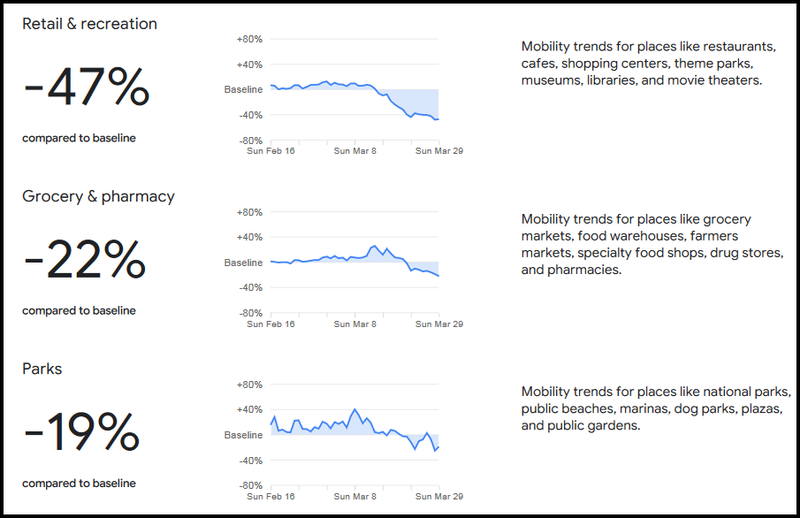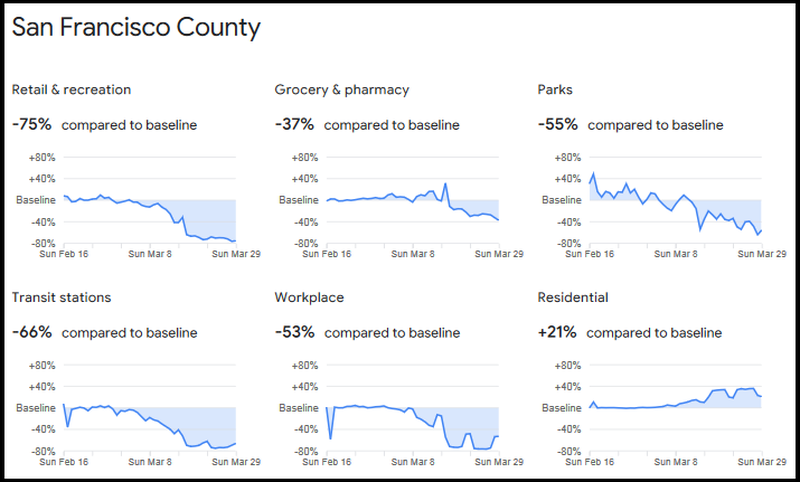Google Publishing Location Data To Monitor Social Distancing
Apr 3, 2020 22:16:53 GMT -5
Post by Berean on Apr 3, 2020 22:16:53 GMT -5
Google Publishing Location Data To Monitor Social Distancing
APRIL 3, 2020
By Tyler Durden
Google has launched a website which uses anonymized location data to show where people are taking social distancing more seriously than others.
Collected from their various products and services, the COVID-19 Community Mobility Reports site will show changes in behavior – such as shopping and recreation, from a top-down look at entire countries – to individual states.

The website will track changes over several weeks – for time periods as recent as 48-to-72 hours prior, and will include 131 countries and certain counties within several states.
Google says the data will be collected in aggregate, rather than at an individual level, and it won’t show absolute numbers of people showing up at parks or grocery stores. The idea instead is to outline percentages, which highlight potential surges in attendance. For example, its first reports states that San Francisco County has seen a 72% drop in retail and recreation, a 55% decline in parks’ population, and a 21% increase in residential population between Feb. 16 and March 29. –CNBC
[below data since updated]

According to the report, public health departments may find this data useful in detecting the next potential coronavirus hotspot when used in conjunction with data collected at the local, state and federal level such as symptoms patients are reporting in emergency rooms. It may also help officials to target residents of certain areas with messaging about social distancing.
“This information could help officials understand changes in essential trips that can shape recommendations on business hours or inform delivery service offerings,” reads Google’s announcement.
That said, the project is bound to raise privacy concerns. While the new site says that it uses anonymized information from people’s “location history” setting in Google Maps and other services – which the company says is “turned off by default,” their location tracking has been the subject of controversy in the past.
April 2019, CNBC’s Todd Haselton found that Google had been tracking his location for years without him realizing it, and explained how to turn tracking off. In October 2019, Australian officials accused Google of misleading consumers in 2018 and earlier about the settings necessary to turn off location tracking. – CNBC
Meanwhile, Google’s parent company, Alphabet, has been trying to work with government officials during the pandemic. Their life-sciences subsidiary, Verily, has already partnered with the Trump administration for a screening and testing website.
link
APRIL 3, 2020
By Tyler Durden
Google has launched a website which uses anonymized location data to show where people are taking social distancing more seriously than others.
Collected from their various products and services, the COVID-19 Community Mobility Reports site will show changes in behavior – such as shopping and recreation, from a top-down look at entire countries – to individual states.

The website will track changes over several weeks – for time periods as recent as 48-to-72 hours prior, and will include 131 countries and certain counties within several states.
Google says the data will be collected in aggregate, rather than at an individual level, and it won’t show absolute numbers of people showing up at parks or grocery stores. The idea instead is to outline percentages, which highlight potential surges in attendance. For example, its first reports states that San Francisco County has seen a 72% drop in retail and recreation, a 55% decline in parks’ population, and a 21% increase in residential population between Feb. 16 and March 29. –CNBC
[below data since updated]

According to the report, public health departments may find this data useful in detecting the next potential coronavirus hotspot when used in conjunction with data collected at the local, state and federal level such as symptoms patients are reporting in emergency rooms. It may also help officials to target residents of certain areas with messaging about social distancing.
“This information could help officials understand changes in essential trips that can shape recommendations on business hours or inform delivery service offerings,” reads Google’s announcement.
That said, the project is bound to raise privacy concerns. While the new site says that it uses anonymized information from people’s “location history” setting in Google Maps and other services – which the company says is “turned off by default,” their location tracking has been the subject of controversy in the past.
April 2019, CNBC’s Todd Haselton found that Google had been tracking his location for years without him realizing it, and explained how to turn tracking off. In October 2019, Australian officials accused Google of misleading consumers in 2018 and earlier about the settings necessary to turn off location tracking. – CNBC
Meanwhile, Google’s parent company, Alphabet, has been trying to work with government officials during the pandemic. Their life-sciences subsidiary, Verily, has already partnered with the Trump administration for a screening and testing website.
link



